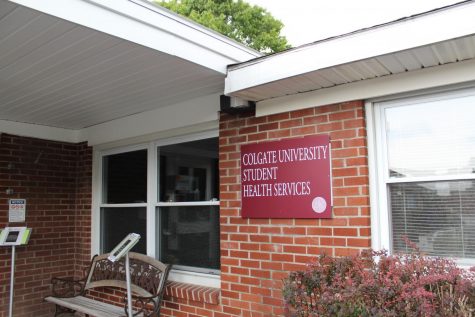Off-Campus Study Office Prepares Students for Unique Study Abroad Experiences amid Covid-19
Studying abroad is a coveted experience for college students. For a few months, students can study beyond their campus and immerse themselves in a foreign culture, take classes and travel the world. Colgate has received national acclaim for its Study Group programs and provides access to hundreds of other Approved Programs so students can go to almost any corner of the world. The Office of Off-Campus Study (OCS) has been working tirelessly to provide those opportunities even amid the pandemic. Now, more than ever, student safety is the top priority as the planning and decision-making processes have adapted to the global takeover of COVID-19.
For those considering a study abroad program, there are two types of semester-long programs students can pursue: Colgate Study Groups and Approved Programs. Study Groups are organized and operated by the university and are led by a Colgate faculty member. Approved Programs are operated by external organizations and partner universities, and are thoroughly vetted by Colgate. The OCS Study Group Fair, hosted annually in the Hall of Presidents, serves as an introduction to the programs being offered for the next academic year and the study abroad application process.
This year’s fair will be held virtually on its own website where students can find information about Colgate Study Groups for the 2021-22 academic year. The site will go live at the beginning of October and include the link to the application, information fliers and a video made by faculty directors explaining the details of their programs. On Oct. 7 from 4 to 5 p.m., all of the faculty directors will be available on Zoom to answer students’ questions.
Although the Spring 2021 Study Groups are being offered as planned, there have been changes to the Spring 2021 Approved Programs due to health and safety concerns. Several approved program providers have altered program locations. The Council on International Educational Exchange (CIEE), for instance, removed program options in Ghana, Senegal and the UAE for the time being. Approved Programs for Spring 2021 in Australia and New Zealand have also been cancelled. For the most part, however, students still have the same options for study abroad programs as they have in previous years, but their experience will be adapted to “the new normal” imposed on us by the pandemic.
While many Spring 2021 programs are planning to go ahead and are continuing preparations under that assumption, nothing is guaranteed. Travel restrictions or sudden outbreaks in destination countries continue to threaten to jeopardize these programs. Students currently enrolled in spring Study Groups and Approved Programs will be notified about the status of their programs from the University or from their approved program director if the trip becomes implausible.
To monitor all program destinations, the OCS Office has been consulting security analysis firm International SOS, overseas partner universities and Approved Program provider organizations. For Colgate Study Groups, final decisions will be made by or before mid-October. For Approved Programs, decisions will be made in October or early November. This will provide ample time for students to organize their spring semester housing and courses.
The OCS Office has been working diligently to prepare students for an unprecedented study abroad experience, so long as it can be done safely. One of the OCS Program Managers, Wendy Nugent, outlined the many factors being considered to determine which programs are safe for students.
“A universal criterion is the lifting of travel restrictions by the U.S. State Department and the CDC (Centers for Disease Control). Colgate requires a Level two or lower by both the U.S. State Department and the CDC for university travel to be in compliance with the Colgate University travel policy. The CDC currently has a level three warning against travel to other countries which makes travel for credit impossible under Colgate’s Pandemic Travel Policy,” Nugent said.
Country-specific criteria address travel restrictions, student visas, availability and safety of travel to the program site, mandated quarantine requirements and border closures. The OCS Office is also evaluating the health and safety guidelines in place in destination countries in case students fall ill, such as the availability of COVID-19 testing, health care for infected students and local guidelines on mask-wearing, de-densification, social distancing and sanitizing.
The limitations could make it difficult or even impossible for students to meet their academic and personal goals for their study abroad experience. Nugent stated that the OCS Office has plans in place for a number of possible outcomes so students can have a semester that is as safe and rewarding as is possible amid a pandemic.
“We have designed detailed plans in the context of student housing, whether instruction will be face-to-face, hybrid or remote, whether internships, lab or fieldwork will be possible, if students will have access to libraries and other academic facilities and whether conditions will allow students to engage with and learn from the local community,” Nugent said. “We also have designed a general shutdown plan in case COVID-19 should make that last resort necessary.”
Just as Colgate has had to reconfigure its classrooms, study spaces and residences, overseas host institutions have done the same. Housing, whether it be in the dormitory of a partner university, the home of a host family or private apartments leased by the university, will be de-densified along with classroom spaces. To ensure safety and hold others accountable, students will sign a commitment to study group health contracts similar to the Commitment to Community Health students signed to return to Hamilton. There will be no personal travel allowed outside the student’s host country. Given the risks and restrictions students will undertake if they choose to study abroad, it is probable that there will be a drop in the number of students who apply.
To help students collect information and make informed decisions, OCS peer advisors have shifted their appointments to a virtual format so they can safely meet with students. Peer advisor and senior Danielle Zarnick commented on the efforts of the staff to help students assess their study abroad options.
“We are using platforms such as Zoom, Google Meets and Google Calendar to facilitate meetings with our peers. We also rely heavily on our website to disseminate information,” Zarnick said.
Peer advisor and senior Katy Gardner urged students to utilize the valuable resource that is the peer advisor staff in light of the fluidity and uncertainty surrounding study abroad programs for the foreseeable future.
“We want students to feel comfortable scheduling meetings with us through the website even for the smallest of questions because that is what we’re here for, to clarify any concerns individuals might have and to give a personal account of the off-campus experience from students who have gone through it themselves,” she said.
The OCS staff will continue to meet with students and provide updates regarding program locations, dates and offerings on their website. Although we are in the throes of controlling and adapting to the pandemic, studying abroad is still a goal for many college students. The OCS Office endeavors to give students the chance to fulfill that goal and have at least one aspect of their college experience that is not taken away due to the virus.











